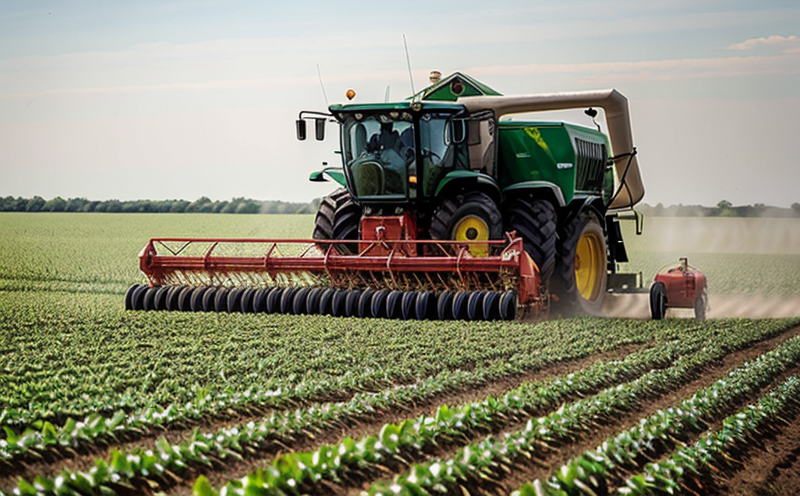Grain Weight per Plant Testing
In agriculture and forestry testing, accurate measurement of grain weight per plant is critical for understanding crop yield and productivity. This service ensures that farmers, researchers, and quality managers can make informed decisions regarding crop management, breeding programs, and resource allocation.
Grain weight per plant testing involves precise quantification of the mass of grains produced by each individual plant in a field or plot. This measurement provides insights into how efficiently plants convert inputs like water, nutrients, sunlight, and genetic potential into usable grain. The results help in assessing crop health, identifying varietal differences, optimizing cultivation practices, and enhancing overall productivity.
The process begins with the selection of representative samples from various parts of a field or plot. These samples are then carefully harvested and processed to ensure that all grains remain intact during weighing. Specialized equipment such as digital scales, balance platforms, and sometimes even automated harvesting machines are used for accurate measurements. The grains are placed in containers specifically designed to prevent contamination and preserve the integrity of the sample.
Once collected, the samples undergo rigorous quality checks to ensure they meet the specified standards for grain weight per plant testing. This involves checking for uniformity, moisture content, and any signs of damage or infestation that could affect the accuracy of the measurements. After inspection, the grains are weighed individually or in small batches using high-precision scales capable of detecting minute differences in mass.
The data collected from these weighings is then analyzed to calculate the average grain weight per plant. This figure can be used to compare different varieties within a single crop or across multiple crops grown under similar conditions. By analyzing historical data alongside current test results, researchers and farmers can identify trends that indicate successful breeding programs or unfavorable environmental factors.
For instance, in wheat production, increased grain weight per plant often correlates with improved genetic traits such as higher protein content and better resistance to disease. Similarly, in corn crops, heavier ears could point towards optimized nitrogen fertilization techniques or superior hybrid varieties. Understanding these relationships allows for targeted improvements in agronomy practices and breeding efforts.
Moreover, grain weight per plant testing plays a crucial role in regulatory compliance and certification processes. Standards like ISO 6729:2018 provide guidelines on how to conduct such tests accurately. Compliance with these standards ensures that agricultural products meet international quality benchmarks, which is essential for export markets.
Our laboratory adheres strictly to these international standards when performing grain weight per plant testing services. This commitment guarantees reliable and consistent results that are trusted by both industry stakeholders and regulatory bodies worldwide.
Applied Standards
When conducting grain weight per plant tests, we follow several international standards to ensure accuracy and reliability of the results. Key among these is ISO 6729:2018, which outlines procedures for sampling, preparation, and analysis of cereal grains. This standard provides clear instructions on selecting representative samples from fields or plots, preparing those samples for weighing, and performing actual weighings.
Additionally, EN 14356-1:2019 offers supplementary guidance particularly relevant to the European market. It covers aspects such as sample conditioning prior to testing, which includes drying grains at specified temperatures until they reach a certain moisture level. Proper conditioning ensures that all samples are comparable and free from external variables influencing the test outcomes.
ASTM E691-14 also plays an important role in validating our methods of measurement by ensuring that analytical results are precise, accurate, and repeatable. This standard specifies good practices for technical measurements and their subsequent use as evidence in support of specific purposes.
Incorporating these standards into our service ensures that we deliver consistent, reliable data that can be relied upon by clients across various sectors including agriculture, food processing industries, and research institutions.
Eurolab Advantages
At Eurolab, our expertise in grain weight per plant testing sets us apart from other laboratories. With state-of-the-art equipment and highly trained technicians, we offer unparalleled precision and accuracy in every test conducted. Our advanced technology allows for quick turnaround times without compromising on quality.
We maintain strict adherence to all applicable international standards mentioned above through comprehensive training programs for our staff and regular audits of our facilities and procedures. This ensures that our methodologies remain up-to-date with the latest developments in agricultural science and technology.
Our extensive experience working closely with clients from diverse backgrounds enables us to tailor our services according to specific needs. Whether you require simple spot checks or comprehensive long-term monitoring projects, we have the capability to meet those requirements effectively.
In addition to providing accurate results, Eurolab also offers valuable interpretative insights based on our findings. Our team of experts can help interpret trends observed in your data sets and suggest potential improvements for future harvests or breeding programs.
Competitive Advantage and Market Impact
The ability to accurately measure grain weight per plant provides significant competitive advantages in the agricultural sector. For instance, farmers who can reliably predict crop yields before planting seasons may better allocate resources like labor, machinery, and finances. Such foresight also allows them to negotiate more favorable terms with suppliers and buyers.
Research institutions benefit from our services by gaining deeper insights into which genetic modifications or environmental factors most significantly impact grain production. These discoveries can lead to breakthroughs in crop science that enhance global food security.
For food processing companies, knowing precisely how much raw material they will receive helps optimize their production schedules and inventory management systems. This reduces waste and improves operational efficiency throughout the supply chain.
In terms of market impact, accurate grain weight per plant testing contributes to increased confidence among consumers regarding the quality and safety of agricultural products. Meeting stringent quality standards enhances brand reputation and fosters trust between producers and end-users.





